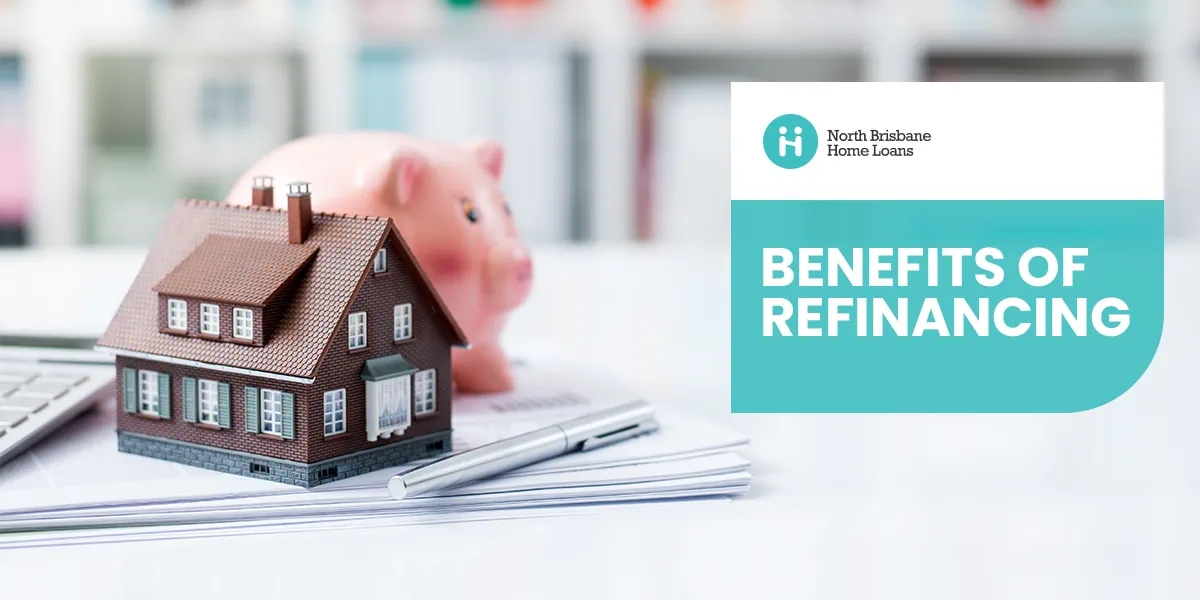How to Reduce Home Loans: Benefits of Refinancing and More
As a homeowner with a mortgage, you may be wondering if it’s worth refinancing your home loan this year. You may not be aware of it but there can be lots of benefits with a home loan refinance. Aside from the ability to reduce home loans by lowering your interest rate and repayments, refinancing can also help you in many different ways. As this article will show you, there are multiple benefits that can come with refinancing your mortgage.
When Australia hit a COVID-induced recession in 2020, the first one in almost 30 years, one of the options available to help homeowners with their home loans was a mortgage deferral package. Essentially, this allowed eligible people with a home loan to put their repayments on pause for a while, or else switch to an interest-only or partial repayment option. After the temporary mortgage deferral period ended, these homeowners went back to making full repayments on their home loan.
Now, a few years after experiencing the financial effects of the COVID-19 pandemic, people are once again faced with home loan repayments that are higher than anticipated. This is because of the RBA’s decision to increase interest rates in rapid succession recently. This is still an after-effect of the pandemic and the RBA’s way of helping the country handle inflation.
The first increase began in May of 2022, with a rise of 0.25 percentage points. This was followed by an increase of 0.50 percentage points in June and so on. This has led to the current cash rate of 4.1%, with varying increases over the months and a few reprieves in April, July, and August of 2023.
Compared with the low rates of previous years, it’s understandable why some people are finding it hard to make mortgage repayments of late. This is where a refinance can come in handy. As mentioned earlier, there are lots of benefits when you refinance your home loan. The ability to reduce your home loan is one of these and the list below will explain further on how that can happen along with the other benefits you can get with a refinance.
Reduce Home Loans, Access Equity, and Other Refinancing Benefits

So, what are the benefits of refinancing? Here are 8 notable ones:
1. Find a lower interest rate to reduce home loans and monthly repayments
If you have a 30-year $500,000 home loan with a 6.69% interest rate, then you would be paying about $3,226 a month in mortgage repayments. If you could refinance to a rate of 5.39%, you can reduce your monthly mortgage repayment to $2,808. Initially, this may not seem like much of a difference. Over time, this lower interest rate on mortgage adds up to savings of over $5,000 in the first 12 months alone!
Although interest rates generally are higher than they have been in the recent past, lenders are still vying for your business and competitive interest rates are on offer. Speaking to a mortgage broker will allow you access to the most competitive interest rates in order to refinance and lower your mortgage payments.
2. Reduce your overall mortgage balance
By refinancing to a lower interest rate, you will reduce the total interest you have to pay over the life of your loan. This can help to lower home loan repayments and reduce your overall mortgage balance. Also, if you can lower your interest rate but maintain the same level of repayments, you could significantly reduce your overall mortgage balance.
The main benefit of reducing your mortgage balance is that it will improve your loan to value ratio (LVR). Your LVR is the difference between what your property is currently worth and how much you currently owe on your home loan. An improved LVR can allow you to access equity sooner and will maximise your return on investment if you decide to sell the property. With a lower LVR, you’ll gain access to better interest rates (as lenders view your loan application as having reduced risk).
3. Refinance to access equity for your financial goals
As mentioned above, lowering your interest rate and improving your LVR can help you access equity. Equity is calculated by subtracting the value of your mortgage from the estimated value of your property. For example, if your property has a value of $500,000, but your mortgage balance is just $320,000, then you have $180,000 in equity. When you refinance to access equity, this allows you to:
- Use the equity as a deposit for an investment property purchase
- Fund the cost of home renovations
- Buy vacant land for future construction
- Obtain cash out to fund a holiday, car, or other purchase
4. Consolidate your high-interest debts into a low-interest home loan
If you have high-interest debts, it may be worth consolidating them into your home loan as part of a refinance. Not only does this convert your existing high-interest debts to a lower interest rate (saving you money on interest), but consolidating your debts means you only have one monthly repayment for all of these through your home loan.
Refinancing your mortgage with this option will allow you to do away with multiple payments, making it easier for you to control your finances. What are the different types of high-interest debt facilities you can consolidate into your home loan? These include:
- Credit cards
- Personal loans
- Car loans
- ATO debts

5. Save your home before your mortgage is in arrears
As a result of the COVID-19 pandemic and subsequent interest rate hikes of late, many people are hurting financially. If you’ve recently experienced major upheavals in your life, such as job loss, illness, or death of a loved one, and are struggling to meet your mortgage repayments, refinancing is a viable option. Refinancing can save you from losing your home by preventing it from going into arrears or even when it’s already in arrears.
If your mortgage is already in arrears, you can work with a mortgage broker to find the best solution to suit your needs. A likely outcome of this scenario is that you’ll refinance with a specialist lender (sometimes referred to as a non-conforming lender) for one to two years. There are special considerations for this option, which will often come with a higher interest rate.
Note, however, that the trade-off is a lender who will review your story and your credit history and then assess your mortgage application based on its merit. Choosing to refinance at the right time can save you from paying higher costs forever. Once your home loan has been “dry-cleaned” and your finances are back on track, you can then look at refinancing for a better interest rate.
6. Move away from a high-interest, bad-credit home loan
Are you currently paying off your mortgage with a specialist or non-confirming lender? Did you know that you can refinance in as little as 6-12 months back to a bank or lender with a much lower interest rate?
To find out if this is an option for you, start by talking to an experienced home loan mortgage broker. If you have a steady income and have been making your repayments on time (since making the switch to your current bad credit home loan), then you may be eligible to refinance to a standard interest rate with a different lender. However, you will need to meet other qualifying criteria, so speak to a refinance broker about your specific situation.
7. Access potential tax benefits by refinancing your mortgage
Are you planning to refinance your home loan with the goal of using equity to invest in property, shares, or other wealth-building opportunities? If so, you may be able to take advantage of negative gearing and depreciation benefits.
It’s important to speak with a tax professional to find out exactly what deductions you will be eligible for. But, as an example, if you were to spend $50,000 renovating an investment property, you could potentially be eligible to claim depreciation on that cost.
8. Finding a better home loan deal that suits you
Many homeowners don’t have the right home loan for their current circumstances. You might have ongoing bank fees attached to your loan, or your home loan might have features you don’t need but are stuck paying for. Maybe your home loan is lacking in features, or it could just be that your interest rate is higher than it needs to be.
By refinancing with the help of a refinance mortgage broker, you can find the right home loan product to suit your needs. And finding the right product to suit your current needs could help you pay off your home loan faster.
At North Brisbane Home Loans, we can help you navigate home loan products and features and provide tailored advice on:
- Fixed-rate home loans
- Variable-rate home loans
- Split mortgages
- Professional packages
- Basic home loan packages
- 100% offset account
- Flexible repayment options
- Repayment holidays or reduced payments for your life situation
- Loan portability, for when you move to another home but want to take your loan with you (rather than arranging a new loan)
How to Determine If You’re Right for Refinancing

Now that you know what the benefits of refinancing are, it’s time to find out if it’s a good thing for you to do.
Refinancing your mortgage can be a smart financial move under the right circumstances. With the current uncertainty in fluctuating interest rates and changing economic conditions, homeowners may see refinancing as an opportunity to save money, access equity, or secure a more favourable loan. However, it’s essential to evaluate your financial situation carefully before deciding if refinancing is the right choice for you.
Review Current Interest Rates and Market Conditions
One of the primary reasons people choose to refinance their home loans is to take advantage of lower interest rates. In Australia, the Reserve Bank of Australia (RBA) sets the official cash rate, which influences lending rates across the banking sector. Monitoring the RBA’s rate announcements and staying informed about market conditions will help you gauge if interest rates have dropped significantly since you obtained your original mortgage.
Assess Your Credit Score and Financial Stability
Before considering refinancing, assess your credit score and overall financial stability. Lenders often use credit scores to determine interest rates and loan eligibility. A higher credit score may lead to more favourable refinancing terms. Obtain a free copy of your credit report from Equifax or another credit bureau to identify any potential issues that might hinder your refinancing prospects.
Additionally, assess your current financial situation, including your income stability, job security, and any outstanding debts. Lenders prefer borrowers with a stable income and low debt-to-income ratio, as these factors increase your chances of approval.
Calculate Potential Savings and Costs
Refinancing comes with various costs, including application fees, legal fees, and valuation costs. Calculate these expenses and compare them to the potential savings you’ll gain from the lower interest rate or reduced loan term.
Understand Your Refinancing Goals
Clarify your objectives for refinancing. Common reasons include to lower monthly payments, reduce the loan term, or reduce home loans altogether. It can also be used to access equity, or switch from a variable-interest to a fixed-interest rate loan. Understanding your goals will help you choose the right refinancing option for your needs.
Speak with an Expert Mortgage Broker
Engaging with a mortgage broker can provide valuable insights into available refinancing options that suit your financial circumstances. These professionals have access to a wide range of loan products and can help you find the most suitable option with competitive interest rates and terms.
Consider the Length of Time You Plan to Stay in Your Home
Think about how long you intend to stay in your current home. If you plan to move soon, the costs associated with refinancing might outweigh the potential savings. On the other hand, if you plan to stay in your home for an extended period, refinancing could yield significant financial benefits over time.
Enjoy the Benefits of Refinancing with the Help of a Mortgage Broker
By working with a mortgage broker, you can find the benefits of refinancing your mortgage without stress. With the latest systems and technology to do all the hard work for you, a qualified refinancing mortgage broker can help find you a great loan rate and the mortgage package with the most suitable loan features for you. They can work out how much equity you can access and liaise with your current lender to manage the whole process.
There are many reasons to refinance your home loan in 2023, and our experienced mortgage brokers at NBHL can guide you through the entire process. Contact us today to see how we can help you refinance your home loan and achieve your financial goals.

Patrick Cranshaw, a Certified Mortgage Professional for over 21 years, founded North Brisbane Home Loans in 2002. His career began with ANZ Bank in New Zealand, where he progressed over 16 years to a Business Banking role in Virginia. After moving to Brisbane in 2000, Patrick led the QLD market for a home loan agency, helped set up the REMAX Real Estate Finance division, and practiced as a broker.







